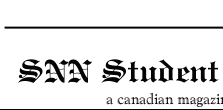 |
 |
|||||
 |
||||||
 |
||||
 |
||||
 |
||||
|
ENTERTAINMENT Feed Your Imagination By Stephen T. , Grade 12, Fredericton High, Fredericton, NB FEED Imagine a time when people think of something they want to know and the information immediately comes to them. How will this be possible? In M.T. Anderson's futuristic "Feed", all young people and most adults have Internet "feeds" implanted into their brains. M. T. Anderson, the author of "Thirsty" and "Burger Wuss", writes picture books and fiction for both adults and young adults. His historical novel, "Handel, Who Knew What He Liked", is the recipient of the Boston Globe-Horn Book Nonfiction Honor for 2002. He has also published a wide variety of classical music reviews and articles in magazines, including BBC Music, Pulse, Cobblestones and The Improper Bostonian. He is currently working on a Gothic novel for adults about the textile industry in 19th century New England. In "Feed", the text is characterized by a saucy style, impeccable pacing, and a richness of content, and all of which harmonize splendidly in a manner befitting the oddly intriguing subject. Anderson's words and anecdotes are well chosen, and his sense of timing heightens impact whether describing Titus's inarticulacy or the discerning thoughts of Violet and her father. Anderson gives us this world through the voice of a boy who, like everyone around him, is almost completely inarticulate, whose vocabulary, in a dead-on parody of the worst teenspeak, depends heavily on three words: "like," "thing," and the second most common English obscenity. Anderson's use of such slang creates believable intellectual for the general public, given that they re all constantly influenced by the stream of media entering their brains. The vulgar language also seems to enhance the story's intensity and give it a brasher, more teenage attitude. It's exhilarating to decipher Anderson's futuristic adolescent slang, but his story is a serious one. He has an uncanny gift for depicting how teenagers see the world. The way in which he envisions the future feels believable. With a manipulative corporate monster that puts a trademark on both school and the weather, trips to the beach in protective suits and mysterious lesions that become fashion accessories, the characters world seems ominously possible. Observing people today, it's not hard to see where M. T. Anderson got his idea for his satire on modern communications. Teenagers text each other all day; colleagues email people at the next desk; for research, you can 'Google' people, events or companies; people listen to personal stereos with a half-glazed look; and teenagers and office workers alike use instant messaging to talk in 'real time' over their PCs or mobile phones. To Titus, the story's teenage protagonist, all of these communication devices exist - but they're fed instantly into his brain. He message-chats his friends; he checks out the latest sale at Weatherbee & Crotch (yes, the satire is sometimes blatant); he can watch the news inside his head and instantly look up words or ideas he doesn't understand from the 'feed'. Despite all this stimulation, he's bored. School "beneath the Clouds" is just about 'how to find bargains... and how to decorate your bedroom', sponsored by all the big corporations. Spring break on the moon with his friends is terrible too, for it doesn't feel like a satisfactory break given the world he knows. The girls in his group still have to watch the daily soap opera 'Oh! Wow! Thing!'' on the feed, and change their hairstyle three times a day as the feed instructs them. When he meets Violet, another American teenager, who is visiting the moon alone, he learns stuff he'd been blinkered to: that only 73% of Americans have the feed, and she only got it when she was seven; that parts of the world are dying, and getting less air, and that the rest of the Global Alliance aren't too keen on American policies. Violet's been home-schooled by her father who resists the feed. When her software begins to have problems, the plot focuses on how she and Titus deal with her mortality, in very different ways. Anderson maintains his satire of teenage life by making sure their romance doesn't last, and that Titus blocks out how much he cares about her eventual death. M.T. Anderson has come up with a mantra for the 21st century: "I wanted to buy some things, but I didn't know what they were." So says Titus, in a very scary and provocative glimpse at what the future might be like for teenagers. This snippet from the book captures the story's purpose, to present a way of the future that is realer than any of us would care to admit, and it demonstrates the ignorance of Titus. Despite the fact that he understands nothing substantial about the world beyond what he's fed , Titus still feels obliged to buy something, evidencing the consumerism that's been installed in him. This is a savage and ultimately moving novel which challenges the reader to think about the way we are manipulated by mass culture. Consumerism becomes America's ruler as Anderson takes today's ideas of what we "must" have and twists them into something that is a lot closer to reality than anyone will ever want to admit. In this unsettling scenario, the reader is forced to anticipate not only what comes next in Anderson's, but perhaps in the world's story. Ultimately, "Feed" is laugh-out-loud funny in its satire, but at the same time it is absolutely terrifying. As technology brings us into a new age of communication, "Feed" explores the possibility of a future of control and brainwashing. "Feed" is a cautionary tale for young people, but be warned, parents this is a book for young adults. "Feed" has profanity, drinking and drug use, as well as sexual situations. It's certainly worth your time. With that said, "Feed" is relevant to any computer user, phone caller or product consumer in the modern world. For teenagers, this is a straightforward warning for what may come to pass, and thus I recommend that all young adults genuinely consider all that Anderson predicts in this book.
|